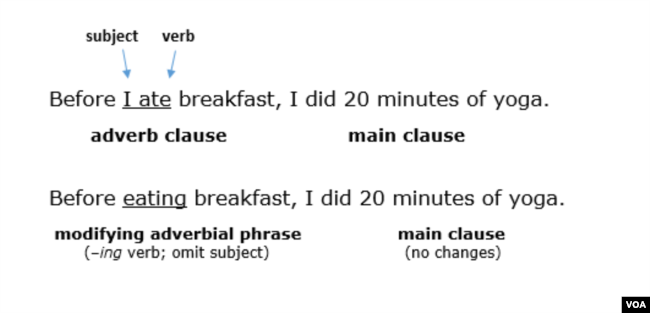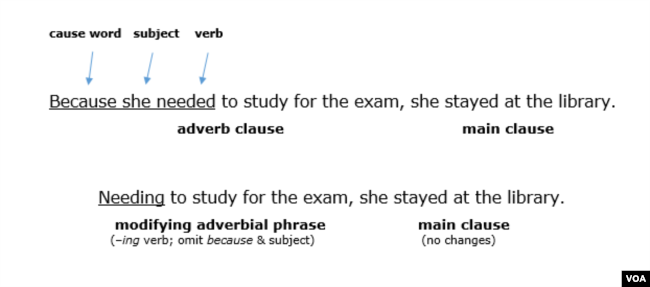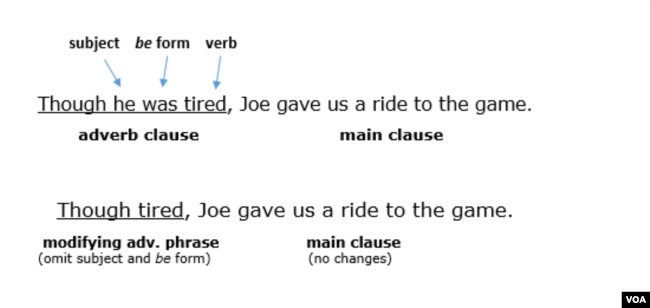When you woke up this morning, you probably did at least five things before you left your home for school or work. Maybe you ate breakfast, took a shower, brushed your teeth, put on your clothes, and looked at the news or internet.
For each thing you did, you did something else before, during or after those other things. For example:
Before I ate breakfast, I did 20 minutes of yoga.
“Before I ate breakfast” is an adverb clause. In an earlier program, we told you about adverb clauses.
Today, we will show you how to shorten these clauses. Shortened adverb clauses often sound more natural and concise in English.
We call the shortened clauses “modifying adverbial phrases.” But, that name is needlessly complex for a grammar structure that is often easy for many English learners.
Listen to the example again:
Before I ate breakfast, I did 20 minutes of yoga.
Here is how we shorten it:
Before eating breakfast, I did 20 minutes of yoga.
Two things are different: we removed the subject “I” and changed “ate” to the -ing form “eating.”
Notice that we only reduced the adverb clause, not the main clause; the main clause -- “I did 20 minutes of yoga” – stays the same.
And, here’s something you may recall from an earlier program: an adverb clause or phrase need not appear before the main clause of a sentence. That means “I did 20 minutes of yoga before eating breakfast” has the same meaning as “Before eating breakfast, I did 20 minutes of yoga.”
There are three types of adverb clauses that can be reduced: time, cause and effect and contrast.
Time clauses
Not all time clauses can be reduced. They must begin with certain time words, like before, after, while, when, since or as soon as.
OK, now test your knowledge on our next example, using while. Listen:
While I was listening to the news, I made a cup of tea.
How can we reduce this clause? Here’s how:
While listening to the news, I made a cup of tea.
So, what's different? Again, we removed the subject. And, this example contains “was,” so we removed it also. In modifying adverbial phrases, we omit forms of be. The verb “listen” is already in -ing form, so we did not change it.
Sometimes, we can even remove the word “while” in a time clause and still express its meaning, which is “during the same time.” Listen:
Listening to the news, I made a cup of tea.
This option is, however, less common, except in some forms of writing.
Cause & effect clauses
Next up are cause and effect adverb clauses. These clauses begin with words like “because” or “since” and express the cause or reason for something; the main clause gives the result.
Here is an example:
Because she needed to study for the exam, she stayed at the library.
To reduce this, we remove the cause word: “because.” And, again, we remove the subject (“she”) and we change the verb “needed” to the ‘ing form, “needing.”
Needing to study for the exam, she stayed at the library.
But, what if the cause and effect clause contains the present* perfect verb tense? Listen to an example:
Because he had been to that museum before, he didn’t want to go again.
And here’s how we reduce it:
Having been to that museum before, he didn’t want to go again.
We removed the word “because” and the subject “he.” And, we changed the present perfect “had been” to “having been.”
Contrast clauses
Finally, we have contrast clauses. These clauses begin with words like “though,” “although” and “despite.” They express an unexpected result between information in the adverb clause and main clause.
Here's an example:
Though he was tired, Joe gave us a ride to the game.
And, when we reduce it:
Though tired, Joe gave us a ride to the game.
Did you notice what changed? For contrast clauses, we keep the contrast word--in this case, "though." But again, we remove the subject. And we remove “was,” a form of be.
Why is the subject removable?
So, how can the meaning of a sentence be clear if we remove the subject from the adverb clause? Because the subject of the adverb clause and the subject of the main clause are the same. If the subjects are different, the adverb clause cannot be reduced. Just for fun, listen to an example of such:
While I was biking to work, a squirrel jumped into the street.
The subject of the adverb clause is “I” and the subject of the main clause is “squirrel.”
And it reduces to this:
While biking to work, a squirrel jumped into the street.
But that is silly! Squirrels do not ride bikes or have jobs!
Well, that’s all the time we have today. Having read this story, do you want to try reducing adverb clauses?
We hope so.
I’m Alice Bryant.
Alice Bryant wrote this story for Learning English. Caty Weaver was the editor.
*past perfect
Now, you try it!
Tell us about your morning using adverbial phrases: What did you do before, after, during, because of or despite something else?
________________________________________________________
Modifying Adverbial Phrases
Time Clauses:
- Remove the subject.
- If there is a be form of the verb, remove it.
- If there is NO be form of a verb, change the verb to -ing.
- If there is a present or past perfect verb, change it to having + past participle.
Cause & Effect Clauses:
- Remove the subject.
- Remove the word “because” or “since”
- Change the verb to -ing form.
- If there is a present or past perfect verb, change it to having + past participle.
Contrast Clauses:
- Remove the subject.
- If there is a be form of the verb, remove it.
- If there is a present or past perfect verb, change it to having + past participle.
Text Source: VOA. “Before Fearing Adverb Phrases, Read This.” VOA, VOA - Voice of America English News, 21 June 2018, learningenglish.voanews.com/a/before-fearing-adverb-phrases-read-this/4448510.html. Accessed 28 Dec. 2019.
Lessons and Exercises:
- BBC Learning English
- Present participle clauses
- Past participle clauses
- BBC English Masterclass: Participle Clauses
- Participle clauses: BBC English Class
- Learn It: Participle clauses
- ThoughtCo
- What Are Reduced Adverb Clauses and How Do They Work?
- Understanding Participial Phrases
- Reducing Adverb Clauses Quiz
- Grammaring: Participle clauses



Comments
Post a Comment